6 Min Read
10 Reasons Kids Should Exercise
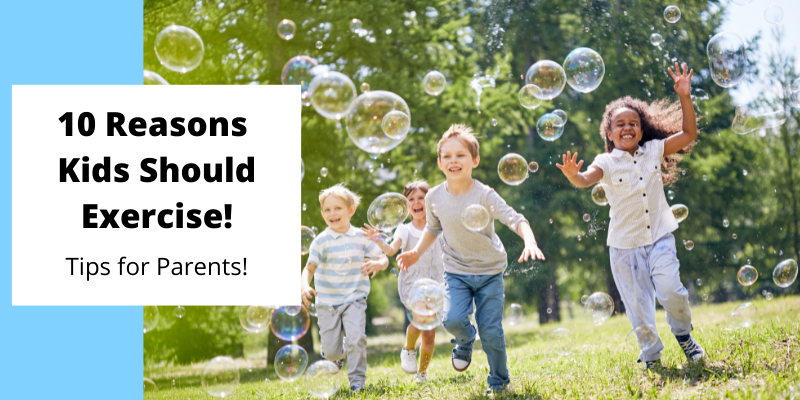
A generation ago, kids spent hours playing with friends after school, usually with minimal parental supervision. Families didn't have to schedule exercise or playdates weeks in advance.
But now, playgrounds and parks stay empty as more kids prefer screen time. Instead of outdoor play, parents prioritize structured indoor activities and academic work. However, this sedentary lifestyle is not doing children any favors.
When you read kid friendly articles on exercising, you will see again and again the undeniable benefits of physical activity for children.
Let’s take a closer look at these benefits.
10 Reasons Kids Should Exercise
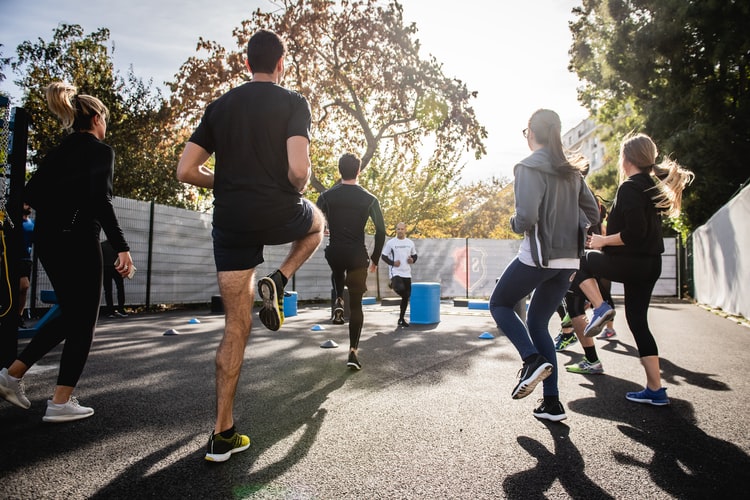
When paired with a nutritious diet, there are multiple reasons why exercise improves the physical, emotional, and mental health of kids.
1. Leads to Better Sleep
We all know how our sleep schedule can influence our life. With kids, this factor holds just as much importance. Not only does it help the brain function more efficiently, but it also contributes to brain development.
The quality of sleep trumps the amount of sleep you get every day. While exercise may not increase the number of hours that children sleep, it certainly does influence the quality of their rest. It’s easier for a tired child to fall into deep, uninterrupted slumber.
2. Improves Heart and Lung Health
The better a child’s fitness in the formative years, the less susceptible they are to heart and lung diseases. Exercise contributes towards better cardiovascular health by improving blood flow to the heart and veins.
Physical activity also requires taking breathing in and breathing out more deeply and frequently. This means more oxygen intake and more output of carbon dioxide.
3. Keeps Weight in Check
A sedentary lifestyle can lead to obesity as unused calories stock up and form fat. When you work out, you lose calories. This forces the body to use the accumulated fat as a backup source of energy.
Losing weight can also decrease your chances of developing cardiovascular and heart diseases in the future.
4. Builds Lean Muscle
Exercise allows kids to build lean muscle mass. Thanks to regular movement and stretching, these muscles develop properly and with greater strength. When children exercise, their metabolism also goes up, decreasing their chances of developing diseases related to harmful abdominal fat.
5. Enhances Bone Health
Bone health deteriorates over time. This can cause diseases like osteoporosis where bones become brittle and prone to damage. Good thing that frequent exercise makes bones denser and stronger.
6. Prevents Issues Related to Screen Time
You must be familiar with the negative effects of prolonged screen time. It threatens eye health, forcing us to resort to alternatives like surgery and blue-light spectacles to enhance our vision.
When we use mobile phones, we’re seldom aware of the posture we sit in, which can progressively cause harm. These issues can be avoided if children replace screen time with exercise.
7. Improves Concentration and Memory
Daily exercise helps boost the brain’s dopamine and serotonin levels. These hormones are related to focus and attention. Physical activity also contributes to better motivation and memory.
8. Promotes Mental and Emotional Well-Being
Physical exercise allows children to deal with their emotions in a positive way. They could direct their stress and anxiety towards achieving fitness goals than resorting to medication or harmful habits.
Thanks to the hormones mentioned previously, people who exercise are generally happier. They have a more positive outlook on life. Because physical exercise usually involves decision-making, kids get to sharpen their mental skills while they’re at it.
9. Boosts Confidence and Mood
Have you ever heard of runner’s high? It’s the feeling of elation that runners get during exercise. It’s attributed to the release of endorphins, the feel-good hormone. Children also experience this natural mood-booster when they are physically active.
Exercise has the power to influence our mood, gearing us towards more positive thoughts and emotions. Physical exercise can thus boost confidence by making children believe in themselves and their capabilities.
10. Delays the Development of Chronic Diseases
By helping kids maintain a healthy weight, exercise greatly reduces their chances of developing diseases like Type 2 diabetes, high blood pressure, cardiovascular disease, and various types of cancer. Physical activity is linked to normal blood pressure and an increase in good cholesterol.
Why You Should Workout with Your Kids
Is it difficult to get your kids moving? Making exercise a family activity is one surefire way to do it. Most parents emphasize the importance of exercising to kids without acting on it. This strategy does not work. In essence, kids learn from their parents.
When you practice what you preach, the kids will understand exercise is a necessary part of everyone’s life. Even better, they should see that keeping themselves strong and healthy can be fun.
Working out together as a family can help you bond with your kids. Older kids especially find it easier to share while doing activities side by side with their parents, as opposed to talking to them face to face. You can use this time to talk about your day and enjoy quality time together.
Why Should Students Exercise?
Numerous studies recommend that physical exercise should be mandatory for children. However, schools are mostly focused on the educational aspects of a student’s life. They rarely give much importance to other areas necessary for a child’s growth and overall well-being.
Students undergo extraordinary pressure to perform well in standardized tests. They barely have time to relax and recharge themselves. Each minute is scheduled to the brim, usually for academic and quiet pursuits.
This is a recipe for disaster.
Since the benefits of exercise for kids are undeniable, physical education and free play should be given importance in the school setting.
Kids and Exercise
Adults and children have different ideas of what exercise looks like. Most adults associate exercise with working out at the gym: running on a treadmill, lifting weights, or taking a fitness class in a controlled environment. Some would rather jog or cycle outdoors, while others prefer gentler practices like yoga or tai chi.

For kids, it’s simple. Exercise equals play. They can do this all day long if you let them. If you’ve ever had the pleasure of taking an entire class to a playground or teaching a PE class, you’ll understand the insane level of energy kids pack in their small bodies.
Exercise comes naturally to children. They don’t care about fitness goals. What they focus on is having fun in the open air. They are compelled to stretch their bodies to the limit.
All you need to do is give them the time, space, and opportunity for play. This can be both unstructured, where kids come up with their own rules and games, or structured like sports.
Types of Exercise for Kids
Kids can get enough exercise with these simple activities. They don’t need fancy equipment or expensive classes, although they may need space to move around.
Get inspiration from this list of exercises for kids!
Cardio Exercise for Kids
- Running

- Climbing
- Jumping

- Games like tag, traffic, and tug of war
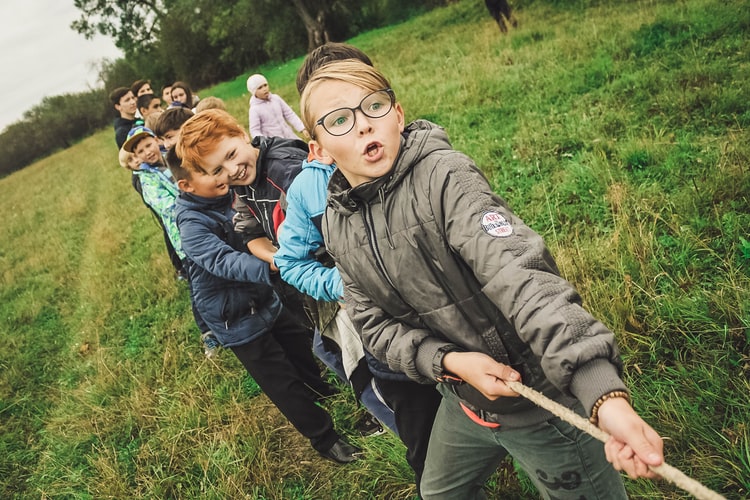
- Ball games
- Skipping rope
- Dancing
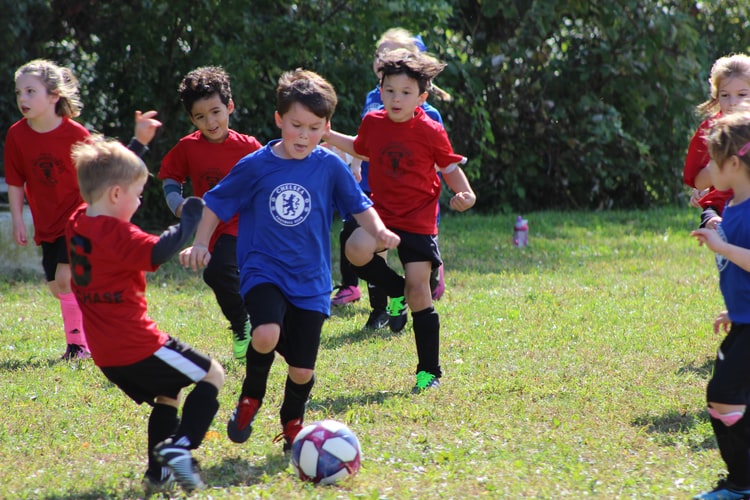
Flexibility and Strength Exercise for Kids
- Planks
- Cartwheels
- Handstands
- Burpees
- Hip bridges
- Push-ups
- Squats
- Lunges
- Sit-ups
- Push-ups
Fun Exercise for Kids
Kids can be picky when it comes to activities. Luckily, there are fun ways to ensure your kids get the exercise they desperately need. Here are a couple of alternatives:
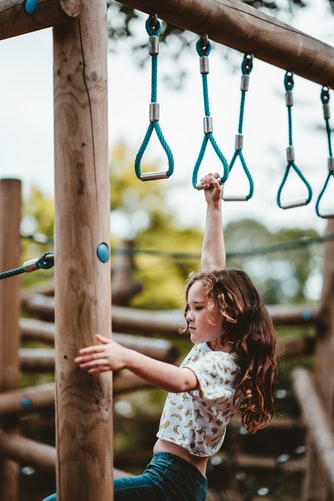
Let Kids Play

Did you know that kids should spend at least one hour in active play? Ideally, children should spend three hours outside so that they get enough sunlight and fresh air.
To do this, you need to evaluate your schedule. Consider dropping some activities and replace them with leisure time. Let kids have the freedom to play outside, get dirty, and explore to their hearts’ content.
Remember, know your kid’s limits. Don’t push them into doing more than they can. With time, they will understand the importance exercise holds in their life and implement it all on their own.





